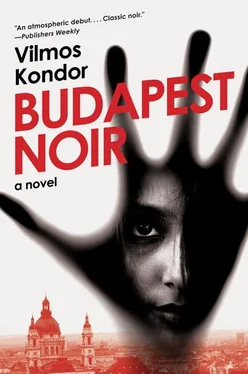“Thanks,” he said softly, then headed off, his eyes fixed on the door. Another waiter opened the door for him. Without looking his way, Gordon only nodded, then hobbled out into the foggy October morning.
As he stepped out onto the sidewalk, the waiting cabbie hit the gas and drove right onto the Margaret Bridge. A black Citroën rolled into its spot in front of Gordon. He didn’t even have time to be incensed before a tall, mustachioed man stepped out of the Citroën. Gordon recognized him as Csomor, one of the detectives with Unit V.
“Good day,” came Csomor’s cheerless greeting. “Please get in, sir,” he said, opening the rear door for Gordon.
“Why should I get in?” asked Gordon angrily.
“Because I asked you to,” replied the detective, moving over to Gordon, taking his arm, and shoving him into the car.
Sitting in the backseat was Vladimir Gellért, a cigarette hanging from his mouth as he read the contents of a file folder.
“What’s this all about?” demanded Gordon.
The chief inspector didn’t reply but kept reading without so much as looking up.
“I asked what this is all about!” Gordon repeated.
“What could it be about?” asked Gellért, looking up. “We’re taking you home. I see you’re tired. And it would have been foolish for you to spend money on a taxi.”
“I spend money on what I want.”
“Start it up, Csomor,” Gellért called out. The detective turned on the engine, then drove up onto the bridge. But at Crown Prince Rudolf Square, rather than staying on the Grand Boulevard, he took a right onto Falk Miksa Street. “This isn’t the way to my place,” Gordon loudly observed, and he wasn’t surprised not to receive a reply. Csomor slowed when passing by Red Margo’s building, and Gellért glanced up at the window. Finally, they came to a stop in front of the Parliament building. Csomor cut the engine.
“And now?” asked Gordon. “What are you up to?”
“The question, Gordon,” said Gellért, closing the file folder, “is what you’re up to. Are you snooping around?”
Gordon was so surprised that he couldn’t even reply.
“Snooping around? Asking questions? Maybe writing an article?” Gellért continued.
“And if I am, what business is it of yours? And anyway, how do you know what I’m working on?”
“Come, now, Gordon,” said Gellért, shaking his head. His face was paler than usual, and not even his glasses could conceal the dark bags under his eyes. The blazer practically hung from his lanky frame. “Don’t you remember? A girl died. You even asked what the deal was with her. Well, we’re on the case now. There you have it.”
“Yes?” asked Gordon scornfully. “And where have you gotten?”
In lieu of an answer, Gellért continued puffing on his cigarette.
“I asked where you’ve gotten.”
“You’re out of line, Gordon. You’re talking with a chief inspector of the Hungarian Royal State Security Police. You’re not the one asking questions. At least I’m not playing detective.”
Gordon slumped back in the seat, exhausted. His kidneys were throbbing with pain, his right hand smarted at every motion, and blood trickled from the wound on his mouth.
Gellért looked at him through a cloud of smoke. “What are you asking questions about a dead prostitute for? What are you up to visiting the medical examiner?”
Gordon opened his mouth to speak, but the detective continued. “Why did you hasten the autopsy? Maybe it was you who got her pregnant? You were scared word would get out? And as long as we’re on the subject, what are you up to scheming with Csuli?”
It took just a moment for Gordon to forget his pain. He sat up and listened attentively to Gellért.
“So you got a little beating,” said Gellért. “Such things have been known to happen. You could have come away worse. Pojva is usually much more determined.”
Gordon wasn’t even surprised to hear this. He’d practically been waiting for Gellért to bring it up.
“Everyone’s scared to death of him out in that slum he lives in, those ramshackle wooden barracks out in eastern Pest that used to be a POW hospital—you know, the Mária Valéria Colony. Looking at you, I’m not surprised they’re scared. No matter. But if you’re thinking you can just slip him some cash and he’ll spill the beans on who hired him, well, forget it.” Gellért rolled the window down a bit, blew out the smoke, and looked at the Parliament building, the flag at half-mast, the guards. Without turning toward Gordon, he went on: “Leave your little investigation be, huh? If you listen to me, you won’t go digging into the affairs of respectable Budapest businessmen. Don’t go snooping around the villas up on Rose Hill. It’s nothing but honest folks who live up there. If you’re looking for trouble, you’ll find it, too, except no one’s going to help you.” Gellért now gestured to Csomor, who started the engine. Through narrowed eyes Gordon watched Gellért, who kept staring out the window. Csomor drove along Báthory Street to Kaiser Wilhelm Road, and from there to Nagymező Street, finally stopping at the corner of Lovag. Csomor got out from behind the wheel and opened the rear door. Gellért now looked at Gordon but didn’t say a thing. Csomor helped Gordon get out of the car before returning to the wheel and heading off.
Gordon pressed the doorbell and slumped against the building wall. In a matter of moments Iváncsik opened the door. “Good, you finally turned up, Mr. Editor,” he said excitedly, helping Gordon into the foyer. On the way up the stairs, he added, “The doctor is very angry that you disappeared.”
Mór did indeed look furious, but on looking twice at Gordon, the anger left his face. “Into the bedroom,” he said to Iváncsik, and after closing the door he helped the super get Gordon inside. They sat Gordon on the bed. Mór removed Gordon’s coat and handed it to the other man. “Put this on the coatrack, Iváncsik.” The super nodded and left the room. “Wait a second,” the old man called after him. “Take these two pengős and go get some sort of lunch from the Jolly Bar.”
Iváncsik nodded again. “Yes, sir, I’ll be back in no time.”
As soon as the super had closed the door behind him, Mór looked at Gordon, who was busily trying to extract a cigarette from his case. The old man helped him out and gave him a light.
“Where were you, son?”
“Not now, Opa,” he replied. “I’ll tell you later. Why don’t you tell me instead what you found out.”
“It wasn’t easy,” Mór began. “You know how many people I found out on the street? Because, of course, I couldn’t just go ringing any doorbells.”
“How did you go about it, Opa?”
“It doesn’t matter, son,” he said. “What matters is, I did it.”
“I was sure you would.”
“Anyway, the father of this particular Shlomo—there are three Shlomos, you know—is Rav Shay’ale Reitelbaum, a rabbi. Have you heard of him?”
“No,” said Gordon, shaking his head. “Should I have?”
“They say he’s the smartest of rabbis. And maybe he is.”
“Why?”
“Because he acted fast when he sensed trouble.”
“What trouble?”
“They say that Shlomo was courting the daughter of the merchant Szőllősy.”
“Fanny,” said Gordon with a nod.
“If you know, why did you send me?”
“I didn’t know, Opa. And did you talk to this particular Shlomo?”
The old man shook his head in disappointment.
“Then I will.”
“You won’t, either.”
“Why not?”
“Because Rabbi Reitelbaum put his son on the train to Hamburg six weeks ago, and from there immediately on the ship to New York. That’s where Shlomo will attend rabbinical school.”
Читать дальше
Конец ознакомительного отрывка
Купить книгу












